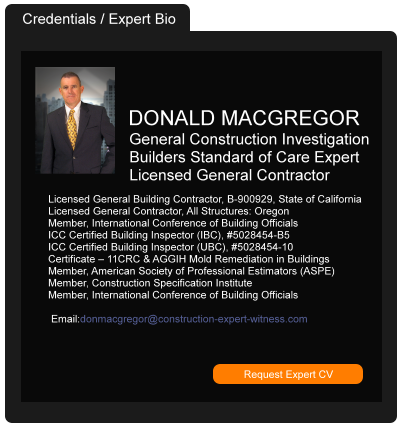BHA Sponsors the 9th Annual Construction Law Institute
January 21, 2016 —
CDJ STAFF Bert L. Howe & Associates, Inc. is proud to be partnering with the Florida Bar Continuing Legal Education Committee and the Construction Law Committee of the Florida Bar Real Property, Probate and Trust Law Section, as a sponsor and exhibitor at 9th Annual Construction Law Institute to be held March 11th, 12th & 13th, 2016 at the JW Marriott Orlando Grande Lakes in Orlando.
With offices in Miami serving all of Florida, Bert L. Howe & Associates, Inc. (BHA) offers the experience of over 20 years of service to carriers, defense counsel, and insurance professionals as designated experts in nearly 6,000 cases. BHA’s staff encompasses a broad range of licensed and credentialed experts in the areas of general contracting and specialty trades, as well as architects, and both civil and structural engineers, and has provided services on behalf of developers, general contractors and sub-contractors.
BHA’s experience covers the full range of construction defect litigation, including single and multi-family residential (including high-rise), institutional (schools, hospitals and government buildings), commercial, and industrial claims. BHA specializes in coverage, exposure, premises liability, and delay claim analysis as well.
As the litigation climate in Florida continues to change, and as the number of construction defect and other construction related cases continues to rise, it is becoming more important for contractors and builders here to be aggressive in preparing for claims before they are made, and in defending against those claims once they are filed. Since 1993, Bert L. Howe & Associates has been an industry leader in providing construction consulting services, and has been a trusted partner with builders and insurance carriers, both large and small, across the Western and Southern United States. Here in Florida, we have been providing construction defect and construction-claims related forensic expert services for the past decade with a proven track record of successful results.
For those of you planning on attending the conference, or those who may know someone who will be, we encourage you to stop by the BHA booth and we welcome the opportunity to discuss further the broad range of services provided by BHA.
For your convenience, here is a link to the registration page for the 9th Annual Construction Law Institute:
http://www.floridabar.org/FBWEB/CLEReg.nsf/zLocations2/MAOS-A4UK4Z?OpenDocument
Read the court decisionRead the full story...Reprinted courtesy of
Coronavirus, Force Majeure, and Delay and Time-Impact Claims
March 30, 2020 —
Garret Murai - California Construction Law BlogIt’s scary, uncertain times as the world grasps with how to deal with the coronavirus pandemic that has now spread to every continent on the globe with the exception of Antarctica. Although this is a global crisis, it has, and for the immediately future will continue to have, a direct impact on us individually as well our industry.
While the impact of the coronavirus on the construction industry is uncertain, what is certain, is that it will have an impact, whether on the construction labor market, on construction supply chains, on the ability of contractors to deliver projects on time and within budget, and on decisions by owners whether to move forward with projects altogether.
According to Ken Simonson, chief economist with the Associated General Contractors of America, during an interview at the ConExpo conference this past week in Las Vegas, while the coronavirus crises “is a story evolving by the hour . . . the impacts on construction are going to happen, but it’s hard to say how extensive, how long they’ll last, [and] how soon they’ll show up.”
From a legal perspective, the coronavirus, and really any natural disaster, from the “Campfire Fire” in Northern California in 2018 to the “Big One” which can happen anytime, has the potential to adversely impact a construction project or shut it down completely. This in turn raises two different, but interrelated legal concepts: (1) force majeure; and (2) delay and time-impact claims.
Read the court decisionRead the full story...Reprinted courtesy of
Garret Murai, Nomos LLPMr. Murai may be contacted at
gmurai@nomosllp.com
“Source of Duty,” Tort, and Contract, Oh My!
September 06, 2023 —
Christopher G. Hill - Construction Law MusingsHere at Construction Law Musings, I have discussed the general rule in Virginia that
tort and contract do not mix. I have also discussed a
few narrow exceptions. A Virginia Supreme Court case from October of 2019 lays out both sides of this issue in one glorious opinion.
In
Tingler v. Graystone Homes, Inc., a summary of the facts and lawsuit(s) are as follows: Water leaks developed after the home was built. Graystone’s post-construction efforts to repair the leaks and remediate mold were unsuccessful. The Tinglers and their children abandoned the home after developing mold-related medical problems. The Tinglers and their children sued Graystone in tort for personal injury, property damage, and economic loss. In other litigation that will not be discussed in this post, but that is described in the opinion linked above, Belle Meade sued Graystone in contract for property damage and economic losses. George and Crystal Tingler filed a separate complaint alleging the same contract claims.
Read the court decisionRead the full story...Reprinted courtesy of
The Law Office of Christopher G. HillMr. Hill may be contacted at
chrisghill@constructionlawva.com
Cutting the Salt Out: Tips for Avoiding Union Salting Charges
January 10, 2018 —
Wally Zimolong - Zimolong LLCThe strategy to avoid union salts is rather simple. But, simplicity does not mean easy. The process requires discipline. A salt is a paid union organizer that attempts to gain employment with a non-union employer for the purpose of either (a) organizing the employers workforce or (b) bringing a costly unfair labor practice charge for discriminatory hiring practices.
A “covert salt” is someone who conceals his union affiliation in order to gain employment with a non-union employer for the purpose of starting a union organizing campaign. Actually, conceal is an understatement. Covert salts actively lie to gain employment with a non-union employer. Covert salts apply for jobs under false names, social security numbers, and use bogus resumes.
Read the court decisionRead the full story...Reprinted courtesy of
Wally Zimolong, Zimolong LLCMr. Zimolong may be contacted at
wally@zimolonglaw.com
Additional Elements a Plaintiff Must Plead and Prove to Enforce Restrictive Covenant
April 19, 2021 —
David Adelstein - Florida Construction Legal UpdatesFlorida Statute s. 542.335 is a statute that deals with restrictive covenants in contracts that impose a restraint on trade. It is an important statute to determine invalid restraints on trade that unreasonably or unfairly prevent competition. Any invalid restraint on trade is unenforceable. Restrictive covenants–or covenants in agreements that restrict you or prevent you from doing something–may unsuspectingly be included in contracts or the impact of the restrictive covenant may not be appreciated at the onset.
A party seeking to enforce a restrictive covenant in a contract has the additional burden of PROVING the validity and reasonableness of the restrictive covenant:
Under section 542.335, three requirements must be satisfied for a restrictive covenant to be enforceable: (1) the restrictive covenant must be “set forth in a writing signed by the person against whom enforcement is sought”; (2) the party seeking to enforce the restrictive covenant “shall plead and prove the existence of one or more legitimate business interests justifying the restrictive covenant”; and (3) the party seeking to enforce the restrictive covenant “shall plead and prove that the contractually specified restraint is reasonably necessary to protect the legitimate business interest or interests justifying the restriction.”
Read the court decisionRead the full story...Reprinted courtesy of
David Adelstein, Kirwin Norris, P.A.Mr. Adelstein may be contacted at
dma@kirwinnorris.com
Firm Leadership – New Co-Chairs for the Construction Law Practice Group
July 02, 2024 —
Haight Brown & Bonesteel LLPPartners Yvette Davis and Beth Obra-White have been named co-chairs for the firm’s Construction Law Practice Group. Yvette, Beth and other diverse leaders within the firm play an integral role in the firm’s Diversity, Equity & Inclusion initiatives.
Congratulations to Yvette & Beth for their new roles as practice group leaders!
Reprinted courtesy of
Haight Brown & Bonesteel LLP
Read the full story...
Read the court decisionRead the full story...Reprinted courtesy of
COVID-19 Business Interruption Claims Four Years Later: What Have We Learned?
September 23, 2024 —
Patrick McKnight - The Dispute ResolverFour and half years ago the COVID-19 pandemic spread around the globe, bringing with it interesting, but challenging, legal problems for construction attorneys. Construction projects ground to a halt. Ever-changing guidance from authorities ranging from the U.S. Department of Labor to local health authorities resulted in a web of evolving obligations for general contractors and subs alike. One of the most closely watched legal questions was the wave of business interruption claims filed by plaintiffs, many of whom owned businesses impacted by government shutdowns. During the opening months of the pandemic, I
noted that hundreds of business interruption claims had been filed by insureds across the country. At that time, the only thing certain was that although the outcome remained unknown, virus exclusions were likely to become more likely in the future. Needless to say, much has happened since early 2020.
What does the data say about the outcome of business interruption claims?
In sum, plaintiffs have had an uphill battle. A helpful resource for analyzing the outcome of business interruption suits is the
Covid Coverage Litigation Tracker (“Tracker”), an insurance law analytics tool offered by Penn Carey Law of the University of Pennsylvania. According to its website, “[t]he Covid Coverage Litigation Tracker is a multi-sourced database and dashboard through which to view the unfolding insurance litigation arising out of the pandemic in federal and state courts. Widely cited in briefs, judicial opinions, and the press, the tracker also serves as a proof of concept for new methods to identify, track, and understand emerging case congregations in real time.”
Read the court decisionRead the full story...Reprinted courtesy of
Patrick McKnight, Fox Rothschild LLPMr. McKnight may be contacted at
pmcknight@foxrothschild.com
KF-103 v. American Family Mutual Insurance: Tenth Circuit Upholds the “Complaint Rule”
May 12, 2016 —
Adria Robinson – Colorado Construction LitigationIn Colorado, the “complaint rule” requires insurance carriers to provide a defense to its insured when the allegations contained in the complaint allege any set of facts that may fall within an insurance policy. Some insurers have pushed back on this rule arguing that it may cause an insurer to exercise its duty to defend although the underlying facts ultimately do not fall within the policy.
In KF 103-CV, LLC v. American Family Mutual Insurance Company, 2015 WL 6517782, the Tenth Circuit of the United States Court of Appeals upheld the complaint rule. In its decision, the Tenth Circuit cited several Colorado state court rulings recognizing the courts’ intent to incentivize insurers to defend policies that may facially fall within the terms of the policy. Where there is uncertainty about coverage, the Tenth Circuit cited a Colorado Supreme Court case stating, “[t]he appropriate course of action for an insurer who believes that it is under no obligation to defend, is to provide a defense to the insured under the reservation of its rights.”
Read the court decisionRead the full story...Reprinted courtesy of
Adria Robinson, Higgins, Hopkins, McLain & Roswell, LLCMs. Robinson may be contacted at
robinson@hhmrlaw.com


































































